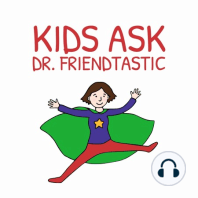5 min listen

Richard, Age 11: Best ways to show empathy
Richard, Age 11: Best ways to show empathy
ratings:
Length:
6 minutes
Released:
Oct 7, 2023
Format:
Podcast episode
Description
Ep. 33 – Richard, Age 11: Best ways to show empathy | Turning caring into actionRichard wants to know how to show more empathy for other kids.Scroll down for discussion questions, a transcript, and how to submit your child's question.Like the podcast? Check out my books and webinars at EileenKennedyMoore.com. Subscribe to my NEWSLETTER, DrFriendtastic.substack.com, to get episodes sent to your email plus Q&A posts for parents.SUBMIT A QUESTION TO DR. FRIENDTASTICAdults, please use your smartphone's memo function or an audio app to record your child's question. Hold the phone close to your child's mouth to make sure the recording is clear. Have your child state:1) their FIRST NAME (or another name),2) their AGE, and3) a BRIEF QUESTION or concern about friendship. (Please do not include any friends' names.)Submit the question at DrFriendtastic.com/podcast or email it to DrF@EileenKennedyMoore.com. (Obviously, this is not psychotherapy, and it’s not for emergency situations.)THINK ABOUT IT QUESTIONS to discuss with your childWhich do you think is the hardest part of showing empathy: Paying attention, imagining the other person’s perspective, caring, or caring action? Why?Why do you think friends who are feeling upset often don’t want advice? What do you think they might want instead? What does Dr. Friendtastic mean when she says, “Unwanted advice can come across as criticism”?How might showing empathy look different with a close friend versus someone you don’t know well?Why is it a good idea to say “you” rather than “I” when you’re empathizing with a friend? How might feeling very emotional yourself get in the way of offering empathy for a friend?Why is it important to ask, “What can I do to help?”Dr. Friendtastic mentions a bunch of examples of small acts of kindness to show you care about someone. What are some small acts of kindness you’ve done to show your friends you care?TRANSCRIPTWelcome! I’m Dr. Eileen Kennedy-Moore, also known as Dr. Friendtastic. I’m an author and clinical psychologist based in Princeton, NJ.Here’s today’s question:Hello, my name is Richard. I'm 11 years old, and my question is, how to show more empathy for your classmates?Hi, Richard! Thank you for sending in this question! I like that you’re asking, not just how to have empathy for other kids, but how to show it.Empathy means feeling for and with someone. So, for example, if a friend feels sad about their goldfish dying, empathy would allow you to also feel sad, along with the friend, which could help you respond in a caring way.The first ingredient of empathy is attention. You need to notice when your friends are feeling emotional. Sometimes, kids will tell you directly, “I’m feeling frustrated!” But sometimes you have to look at their nonverbal communication–how they’re showing emotions in their face, body, or tone of voice.For instance, if you’re playing a game, and your friend suddenly stops talking and just stands there with their arms crossed, looking away, with their lips tightly together and their eyebrows down–whoa! Those are a whole bunch of clues that the friend is having some big feelings!The second ingredient of empathy is perspective-taking: imagine how the friend might be feeling and why. It takes practice to get good at this. Use what you know about your friend, plus your own experience, and think about how the friend might be reacting to whatever’s happening. It helps if you know lots of words to describe emotions, so you can understand them and tell them apart.Using the example of the friend who stopped playing, maybe that friend is feeling frustrated or discouraged or jealous or angry or hurt… Thinking about what’s happening, how your friend has reacted in the past, and how you would react in that situation can help you guess how your friend might be feeling.The third ingredient is caring. You might notice and understand someone’s feelings, but unless you care, you can’t empathize. When you have empathy for a friend, if the friend i
Released:
Oct 7, 2023
Format:
Podcast episode
Titles in the series (56)
Adrian, Age 8: Kid bullies him at recess by Kids Ask Dr. Friendtastic